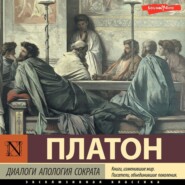По всем вопросам обращайтесь на: info@litportal.ru
(©) 2003-2024.
✖
Phaedo
Настройки чтения
Размер шрифта
Высота строк
Поля
Yes.
And is it likely that the soul, which is invisible, in passing to the place of the true Hades, which like her is invisible, and pure, and noble, and on her way to the good and wise God, whither, if God will, my soul is also soon to go, – that the soul, I repeat, if this be her nature and origin, will be blown away and destroyed immediately on quitting the body, as the many say? That can never be, my dear Simmias and Cebes. The truth rather is, that the soul which is pure at departing and draws after her no bodily taint, having never voluntarily during life had connection with the body, which she is ever avoiding, herself gathered into herself; – and making such abstraction her perpetual study – which means that she has been a true disciple of philosophy; and therefore has in fact been always engaged in the practice of dying? For is not philosophy the practice of death? —
Certainly —
That soul, I say, herself invisible, departs to the invisible world – to the divine and immortal and rational: thither arriving, she is secure of bliss and is released from the error and folly of men, their fears and wild passions and all other human ills, and for ever dwells, as they say of the initiated, in company with the gods (compare Apol.). Is not this true, Cebes?
Yes, said Cebes, beyond a doubt.
But the soul which has been polluted, and is impure at the time of her departure, and is the companion and servant of the body always, and is in love with and fascinated by the body and by the desires and pleasures of the body, until she is led to believe that the truth only exists in a bodily form, which a man may touch and see and taste, and use for the purposes of his lusts, – the soul, I mean, accustomed to hate and fear and avoid the intellectual principle, which to the bodily eye is dark and invisible, and can be attained only by philosophy; – do you suppose that such a soul will depart pure and unalloyed?
Impossible, he replied.
She is held fast by the corporeal, which the continual association and constant care of the body have wrought into her nature.
Very true.
And this corporeal element, my friend, is heavy and weighty and earthy, and is that element of sight by which a soul is depressed and dragged down again into the visible world, because she is afraid of the invisible and of the world below – prowling about tombs and sepulchres, near which, as they tell us, are seen certain ghostly apparitions of souls which have not departed pure, but are cloyed with sight and therefore visible.
(Compare Milton, Comus: —
'But when lust,
By unchaste looks, loose gestures, and foul talk,
But most by lewd and lavish act of sin,
Lets in defilement to the inward parts,
The soul grows clotted by contagion,
Imbodies, and imbrutes, till she quite lose,
The divine property of her first being.
Such are those thick and gloomy shadows damp
Oft seen in charnel vaults and sepulchres,
Lingering, and sitting by a new made grave,
As loath to leave the body that it lov'd,
And linked itself by carnal sensuality
To a degenerate and degraded state.')
That is very likely, Socrates.
Yes, that is very likely, Cebes; and these must be the souls, not of the good, but of the evil, which are compelled to wander about such places in payment of the penalty of their former evil way of life; and they continue to wander until through the craving after the corporeal which never leaves them, they are imprisoned finally in another body. And they may be supposed to find their prisons in the same natures which they have had in their former lives.
What natures do you mean, Socrates?
What I mean is that men who have followed after gluttony, and wantonness, and drunkenness, and have had no thought of avoiding them, would pass into asses and animals of that sort. What do you think?
I think such an opinion to be exceedingly probable.
And those who have chosen the portion of injustice, and tyranny, and violence, will pass into wolves, or into hawks and kites; – whither else can we suppose them to go?
Yes, said Cebes; with such natures, beyond question.
And there is no difficulty, he said, in assigning to all of them places answering to their several natures and propensities?
There is not, he said.
Some are happier than others; and the happiest both in themselves and in the place to which they go are those who have practised the civil and social virtues which are called temperance and justice, and are acquired by habit and attention without philosophy and mind. (Compare Republic.)
Why are they the happiest?
Because they may be expected to pass into some gentle and social kind which is like their own, such as bees or wasps or ants, or back again into the form of man, and just and moderate men may be supposed to spring from them.
Very likely.
No one who has not studied philosophy and who is not entirely pure at the time of his departure is allowed to enter the company of the Gods, but the lover of knowledge only. And this is the reason, Simmias and Cebes, why the true votaries of philosophy abstain from all fleshly lusts, and hold out against them and refuse to give themselves up to them, – not because they fear poverty or the ruin of their families, like the lovers of money, and the world in general; nor like the lovers of power and honour, because they dread the dishonour or disgrace of evil deeds.
No, Socrates, that would not become them, said Cebes.
No indeed, he replied; and therefore they who have any care of their own souls, and do not merely live moulding and fashioning the body, say farewell to all this; they will not walk in the ways of the blind: and when philosophy offers them purification and release from evil, they feel that they ought not to resist her influence, and whither she leads they turn and follow.
What do you mean, Socrates?
I will tell you, he said. The lovers of knowledge are conscious that the soul was simply fastened and glued to the body – until philosophy received her, she could only view real existence through the bars of a prison, not in and through herself; she was wallowing in the mire of every sort of ignorance; and by reason of lust had become the principal accomplice in her own captivity. This was her original state; and then, as I was saying, and as the lovers of knowledge are well aware, philosophy, seeing how terrible was her confinement, of which she was to herself the cause, received and gently comforted her and sought to release her, pointing out that the eye and the ear and the other senses are full of deception, and persuading her to retire from them, and abstain from all but the necessary use of them, and be gathered up and collected into herself, bidding her trust in herself and her own pure apprehension of pure existence, and to mistrust whatever comes to her through other channels and is subject to variation; for such things are visible and tangible, but what she sees in her own nature is intelligible and invisible. And the soul of the true philosopher thinks that she ought not to resist this deliverance, and therefore abstains from pleasures and desires and pains and fears, as far as she is able; reflecting that when a man has great joys or sorrows or fears or desires, he suffers from them, not merely the sort of evil which might be anticipated – as for example, the loss of his health or property which he has sacrificed to his lusts – but an evil greater far, which is the greatest and worst of all evils, and one of which he never thinks.
What is it, Socrates? said Cebes.
The evil is that when the feeling of pleasure or pain is most intense, every soul of man imagines the objects of this intense feeling to be then plainest and truest: but this is not so, they are really the things of sight.
Very true.
And is not this the state in which the soul is most enthralled by the body?
How so?
Why, because each pleasure and pain is a sort of nail which nails and rivets the soul to the body, until she becomes like the body, and believes that to be true which the body affirms to be true; and from agreeing with the body and having the same delights she is obliged to have the same habits and haunts, and is not likely ever to be pure at her departure to the world below, but is always infected by the body; and so she sinks into another body and there germinates and grows, and has therefore no part in the communion of the divine and pure and simple.
Most true, Socrates, answered Cebes.
And this, Cebes, is the reason why the true lovers of knowledge are temperate and brave; and not for the reason which the world gives.

















